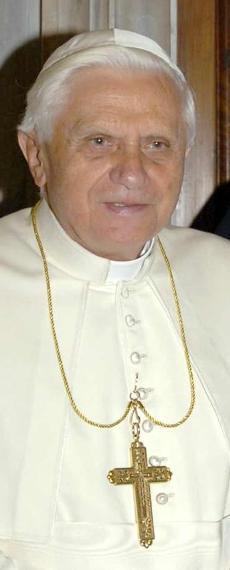By James Ahearn
Daily Record
March 30, 2010
http://www.northjersey.com/news/opinions/ahearn_033110.html
 |
| Pope Benedict XVI |
THE ESCALATING scandal in the Roman Catholic Church about sex abuses by rogue priests is rooted in two church doctrines.
The first is that sinners can obtain absolution in the confessional, with the admonition that they go forth and sin no more. Some mend their ways. Some don’t. The plight of a victim is treated as a separate matter.
The second tenet is that scandalous information about the church must be kept secret.
Hence the shock of the disclosures in The New York Times last week. We did not know, we could not have suspected the extent of the abuses the paper reported in Wisconsin and Germany.
In Wisconsin, the Rev. Lawrence Murphy, who worked at a renowned school for deaf boys, molested as many as 200 of them from 1950 to 1974.
Informed of the offenses, the archbishop of Milwaukee at the time quietly transferred Murphy to a diocese in northern Wisconsin, where he worked with children in parishes, schools and a juvenile detention center.
A subsequent archbishop, Rembert Weakland, wrote two letters about the case to the Vatican office that decides whether accused priests should be subjected to secret canonical trials and, if found guilty, defrocked.
The office, the Congregation for the Doctrine of the Faith, was then led by Cardinal Joseph Ratzinger, the current pope. He did not respond to the letters, but after eight months, an assistant, Cardinal Tarcisio Bertone, instructed Weakland to convene a trial.
Written protest
That prompted Murphy, the errant priest, to write Cardinal Ratzinger, protesting that he should not be subjected to trial because he had already repented and was in poor health, and that prosecution was precluded by the church’s statute of limitations.
“I simply want to live out the time that I have left in the dignity of my priesthood,” Murphy wrote. “I ask your kind assistance in this matter.” There is no record of a response from Ratzinger. In 1998, with the case unresolved, Murphy died, still a priest.
Media attention has focused on the role played here by the future Pope Benedict XVI. Questions have also been raised about his handling of another pedophile case, in 1980, when he was archbishop of Munich and direct supervisor of a priest, Peter Hullermann, who had previously molested boys.
Ratzinger approved psychiatric treatment of Hullermann for pedophilia. Subsequently the cardinal was informed that Hullermann had won approval to return to pastoral work, soon after beginning treatment. He was later convicted of molesting boys in another parish.
What are we to make of all this? What role did Ratzinger play in dealing with the epidemic of clerical sexual abuse that has surfaced in Ireland, the United States, Germany, Austria and the Netherlands?
As an archbishop and as head of the Vatican office that deals with rogue priests, he was directly involved in addressing the problem. He did not shy from action. In the United States, for example, 700 priests were dismissed in a tumultuous three-year period.
Ratzinger did direct bishops worldwide to keep pedophilia investigations secret. The impetus was, again, concern that publicity would damage the image and teaching authority of the church.
But it can also be argued that nobody at the Vatican did more to confront abuse than Cardinal Joseph Ratzinger. So says John L. Allen Jr., senior correspondent for The National Catholic Reporter and author of “The Rise of Benedict XVI.”
In an Op-Ed piece published, again, by The Times, Allen says that Ratzinger’s exposure to the “filth” of abuse convinced him a decade ago that drastic action was necessary.
Accordingly, he devised an accelerated procedure for dealing with 60 percent of offenders through administrative action, rather than through cumbersome canonical trials. A policy of “zero tolerance” was established, depriving bishops of discretion to go easy on offenders.
One of Ratzinger’s first acts as pope was to discipline two high-profile clerics who had staved off abuse prosecutions for decades. They had friends in high places.
Benedict XVI was also the first pope to meet with victims of abuse, in the United States and Australia, two years ago. And he was the first pope to devote an entire pastoral letter to the abuse crisis, in his recent apology to the people of Ireland for 16 years of cover-up scandals.
More can be done, though. For openers, it should be standard procedure in flagrant cases, as with Murphy and Hullermann, that law enforcement officials be notified early that there was evidence that crimes had been committed.
Such cases should be handled primarily by civil authorities, not clerics. Notification by a bishop will relieve the pressure on prosecutors and politicians anxious not to offend the largest religious denomination in America.
James Ahearn is a former managing editor of The Record. Comments: letterstotheeditor@northjersey.com
Any original material on these pages is copyright © BishopAccountability.org 2004. Reproduce freely with attribution.